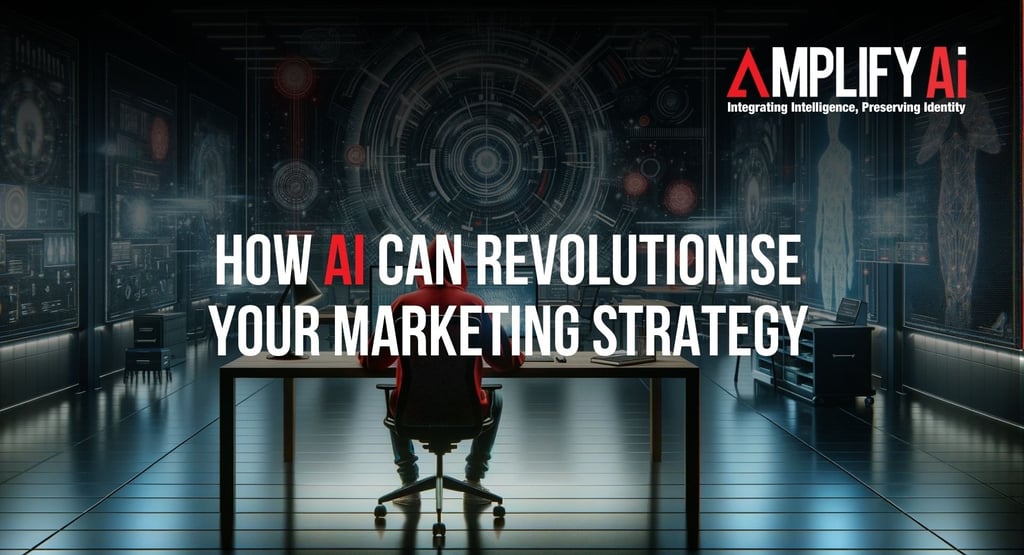How AI Can Revolutionise Your Marketing Strategy
Ronsley Vaz
4 min read


As the digital landscape evolves, businesses seek new ways to improve their marketing results and stay ahead of the competition. One of the most promising solutions for achieving these goals is artificial intelligence (AI).
Imagine you're trying to navigate a dark forest without a map or a compass. You can find your way through trial and error, but it is slow and difficult. Imagine you have a GPS system that can guide you through the forest with pinpoint accuracy, getting you to your destination quickly and efficiently. That's the power of AI in marketing.
AI is a powerful tool that can help businesses optimise their marketing strategies, increase their return on investment, and gain a competitive edge in their industry. By analysing data, identifying patterns, and making predictions, AI can help businesses make more informed decisions and achieve better results.
Understanding the Different Types of AI
Several types of AI can be used in marketing, each with unique applications and benefits. Generative AI is a type of artificial intelligence that can create new content, such as text, images, and music, based on patterns it has learned from existing data. It can be used to create content, while natural language processing can be used to analyse customer feedback. Machine learning can be used to identify customer behaviour patterns and predict future trends. By understanding the different types of AI and their applications, businesses can find ways to optimise their marketing performance and stay ahead of the competition.
Which Processes to Target with AI
One of the businesses biggest challenges when implementing AI is determining which processes to target. To determine potential ROI for AI initiatives, businesses should assess which processes can benefit the most from AI.
One of the most significant benefits of using AI in marketing is the ability to automate time-consuming tasks, such as data analysis and reporting. Traditional processes would require hours of manual work. Still, businesses can save time and resources with AI while achieving better results.
AI can also help optimise marketing budgets by analysing data from multiple sources and recommending how to allocate resources most efficiently. In contrast, traditional budgeting processes may rely on gut instincts or limited data, leading to suboptimal results.
How AI Can Optimise Your Marketing Budget
By analysing data from multiple sources, AI can help businesses allocate their marketing budget more effectively, ensuring that each dollar is spent most efficiently. AI can also help businesses identify anomalies in their marketing campaigns, such as unexpected drops in performance, and make recommendations for how to address them.
A small business owner who wants to improve their social media strategy. Without AI, they might spend hours analysing data, determining which posts generate the most engagement. With AI, they can automate this process, allowing them to focus on creating content and engaging with customers. The AI algorithm can analyse data from multiple sources, identify patterns in customer behaviour, and make recommendations for optimising the business's social media strategy. This can increase engagement, conversions, and ROI for the company.
The Role of Human Intelligence in Decision-Making
While AI can be a powerful tool for improving marketing metrics, it's important to remember that it's not a substitute for human intelligence. AI should enhance and augment human decision-making, not replace it. It's also essential to ensure that the output of AI is transparent and of high quality.
If a business owner lets AI make all the decisions without human oversight, it could lead to unintended consequences and potentially harm the business. AI is a powerful tool, but it's imperfect and can make mistakes or overlook important factors. By relying solely on AI, businesses risk losing the human touch essential for building strong customer relationships and making informed decisions.
This means that AI systems should be designed and developed to allow users to understand how they arrive at their conclusions and recommendations. Additionally, AI should be subject to rigorous testing and validation to ensure that it is accurate and unbiased.
Ensuring Transparency and Ethical Use of AI
One of the biggest concerns with AI is ensuring that it is used ethically and transparently. The use of AI in marketing raises questions about privacy, data ownership, and algorithmic bias. To address these concerns, businesses should be transparent about how they use AI and ensure that the underlying algorithms and decision-making processes are communicated to stakeholders. Additionally, companies should ensure that their use of AI is compliant with all relevant laws and regulations.
Future Trends and Emerging Technologies in AI
The future of AI in marketing is bright, with new use cases and applications being developed all the time. From generative AI to customer service and beyond, the possibilities are endless. As AI technology develops, it will become more accessible to businesses of all sizes, allowing for more personalised and effective marketing strategies. By staying ahead of the curve and finding ways to integrate AI into their marketing efforts, businesses can gain a competitive edge and achieve better results.
AI is a powerful tool that can help businesses optimise their marketing strategies, increase their return on investment, and gain a competitive edge in their industry. By understanding the different types of AI and their applications, businesses can find ways to optimise their marketing performance and stay ahead of the competition. However, it's important to remember that AI should enhance human decision-making, not replace it. By ensuring transparency and ethical use of AI and staying ahead of emerging trends and technologies, businesses can maximise the benefits of AI and achieve better results.

Subscribe to the podcast
Subscribe now to "Amplify Ai" and let's set sail together on this exciting voyage towards business growth and success.



